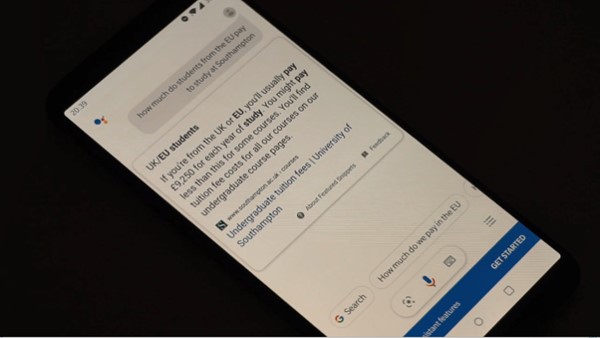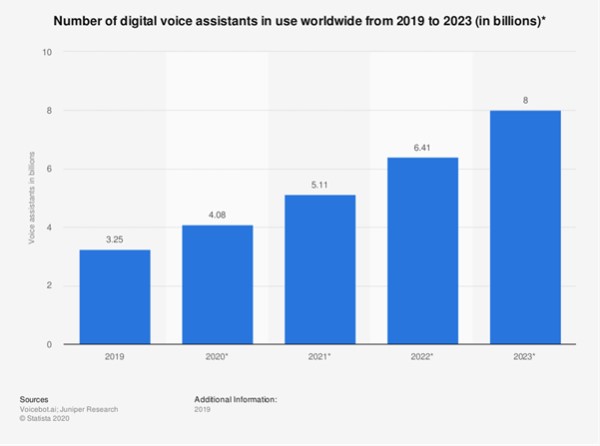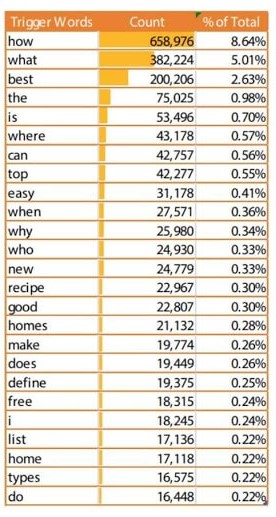The discoverability of our online services is critical in a very competitive market. As digital user experience and SEO specialists, we’ve been looking at best practices to see how we can maximise opportunities for our university.
For example, voice search is probably something you’ve been hearing more and more about. It’s become more popular in recent years due to the improvements made by search engines. Here’s a quick look at why that matters for us:
 Figure 1: Example of using voice search for UoS
Figure 1: Example of using voice search for UoS
Access needs first
Why does it matter?
As a team, our goal is to deliver digital services that meet the needs of all our diverse user groups.
We all know that voice assistants are on the rise and there is a vast amount of complexity in how we connect in a digital world.
As of 2019, there were an estimated 3.25 billion digital voice assistants being used in devices around the world. Forecasts from Juniper Research suggested that by 2023 the number of digital voice assistants will reach around 8 billion units – more than the world’s population.
Voice interfaces are also ‘old hat’ for many people with access needs and there’s much excitement in the accessibility community about voice assistants. Their dramatically simpler interface has the potential to help lots of people who read and consume content through their ears rather than eyes.
For our team, working on voice is an opportunity to meet the rising expectations of users and make our services more findable, accessible and usable.
 Source: Juniper Research
Source: Juniper Research
Making UoS more understandable to search engines
Voice search allows a user to search via voice commands rather than written. First introduced in 2010 on the Google platform, it’s evolved over the past decade and become easier for users to interact with.
What made voice search a more popular method of finding information was thanks to the introduction of an algorithm change, known as ‘Hummingbird’, in 2013. This focused on ‘semantic search’, which enabled Google to recognise the user’s meaning and intent more successfully, and produce results that would satisfy a voice search query.
This is important because intent is about what users want to do, what they search for, and what you do with that data. We use SEO tools for it and the way people talk, or search can help us as a team to determine what they are trying to do. It also helps us to work alongside our content design colleague and help them prioritise content and determine the language we use to help our users.
An example of this, is the use of question and answer based content amongst our new course pages. What we’ve found is content that features as a structured snippet on Google search is most likely to appear for voice search queries too:

 Source: Google
Source: Google
In this example, we’re using voice search for “what is criminology and psychology”. We’ve structured the content to produce an easily digestible section of information explaining the definition of criminology and psychology.
How does voice search differ from traditional search?
The way we use language when speaking is very different to when we’re typing. People tend to use shorter or more colloquial words and phrases when searching for information with their voices.
For example, a search for the University’s location may be expressed as: “University of Southampton location” when typed into Google. But when speaking to a voice assistant, a user is more likely to more naturally ask “Hey Google, where is the University of Southampton?”
Voice search tends to be very specific.

Source: Brightlocal
Why is voice search so popular?
Well, there’s a few reasons why…
It’s faster and easier to search
Voice search is significantly faster than traditional methods of searching for anything online; making it a very popular alternative to typing into a search engine.
Results tend to be more appropriate and convenient
When it’s faster and easier to find answers, it makes it more convenient for all. Where it becomes more appropriate is the use of structured data. The change in search behaviour resulted in an algorithm change as mentioned previously. This required SEO specialists and web developers to adapt code and structure data in a way that met the needs of search engines.
This means that not only are results faster, they are much more specific and appropriate for the user.
With the era of voice search well underway, structured data has enabled websites to get on board too. This is because it breaks down information in a way that search engines can understand and interpret. You may have heard of Schema.org before, which is a specific format most websites use. Search engines are now able to read the code and use it to display search results in a specific and much richer way.
It’s more apt for mobile
Smartphones and tablets are everywhere and this makes it essential for anything to be made with mobile in mind. This applies to search engines too; with mobile-first indexing launched a few years ago, it has all worked to enhance users’ experience with their devices. With the ability to speak to your phone, voice search really took off.
How can we as a university adapt this into our SEO strategy?
So, with all that we know about voice search and the wild and wonderful workings of search engine algorithms – we’re left with a question: “Hey UoS, are we ready for voice search?”.
The answer is: yes.
As part of OneWeb, we’re looking at a strong focus on collaboration with our development team and UX disciplines to work with templates that allow for structured data.
You can’t understand content without understanding search intent data, so we’re incorporating and restructuring our content, as well as adapting the conversational language we use with help from content designers.
That’s not all though. We are always striving to improve our website’s user experience, and this is just the beginning. Voice search is a great opportunity for us and is likely to continuously evolve. What we need to discover is whether voice search is ready for university-based searches.
We would like to invite you to share any ideas you have on this topic with us! You can contact the SEO Digital User Experience team by emailing us. Thanks!